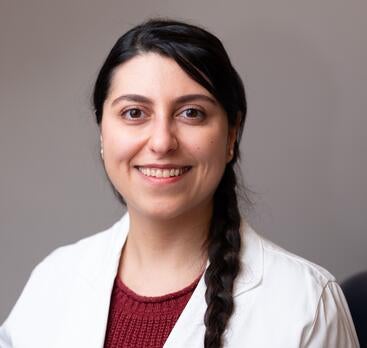Dr. Mahsa Khayat-Khoei, a new faculty member in the Department of Psychiatry and Neurosciences at the UCR School of Medicine, has received a Career Development Award from the American Academy of Neurology for her project “Monocyte Signatures in Progressive Multiple Sclerosis.”
Monocytes are part of the innate immune system, our first line of defense. They are white blood cells that circulate in the bloodstream. They also can migrate into tissues such as the brain, liver, or lungs, where they transform into a special kind of resident immune cells (pseudo-macrophages) that detect and remove pathogens or damaged cells. While monocytes play a key role in triggering and regulating inflammation to fight infection, excessive activation may cause tissue damage — an effect Khayat-Khoei is studying in multiple sclerosis (MS).
Khayat-Khoei’s project seeks to understand how nerve damage and disease progression occur in secondary progressive multiple sclerosis (SPMS), the most common progressive form of MS for which no fully effective treatment is currently available. She will study how monocytes become activated and interact with neurons and neuronal support cells (neuroglial cells).
“We want to understand the pathology of disease progression in SPMS, and how the innate immunity, specifically monocytes, might be causing more nerve damage in SPMS,” said Khayat-Khoei, an assistant professor of clinical neurology. “By looking at how these cells interact with brain cells and neuroglial cells, we hope to get a better handle on what’s driving the disease, which can then help us identify better treatment targets for MS and other immune-related neurodegenerative disease, such as Alzheimer’s.”
A neurologist and neuroimmunologist at UCR Health, Khayat-Khoei brings clinical and research expertise in MS and other neuroinflammatory and neurodegenerative disorders. She joined the UCR faculty this month.
“We are thrilled to welcome Dr. Mahsa Khayat-Khoei to UCR and to see her advancing translational neuroscience research that will ultimately benefit the communities we serve in the Inland Empire,” said Dr. Lisa Fortuna, chair of the Department of Psychiatry and Neuroscience.
The American Academy of Neurology, the world’s largest association of neurologists, provides education, resources, and advocacy to advance brain health and improve treatment and prevention of brain diseases for all.
